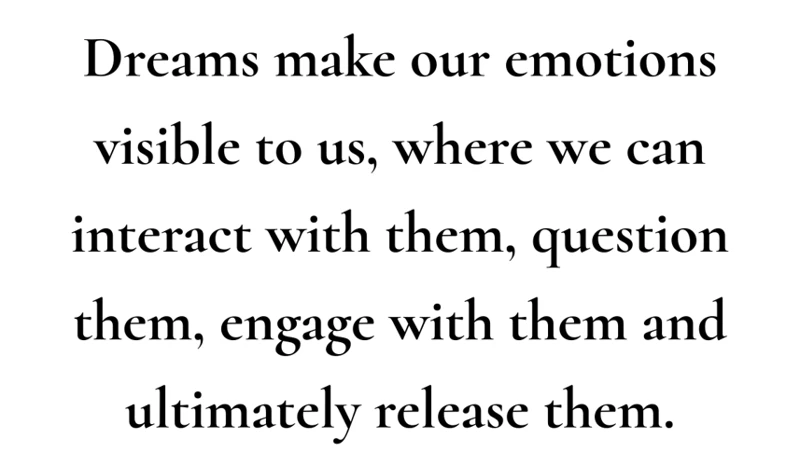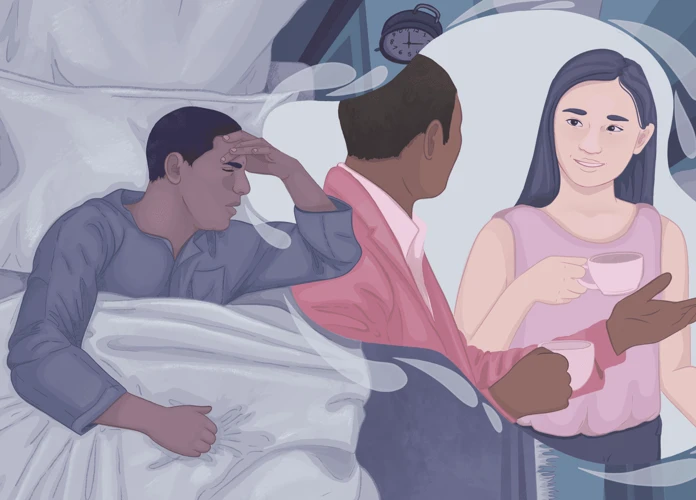Have you ever woken up from a vivid dream that seems to haunt you night after night? Recurring dreams can be both intriguing and puzzling, as they often hold hidden meanings and messages from our subconscious mind. In this article, we will delve into the fascinating world of recurring dreams and explore the possible interpretations behind dreams about people or situations. By decoding these hidden meanings, you may gain valuable insights into your own emotions, relationships, and life circumstances. So, let’s embark on this journey together and unlock the secrets behind your recurring dreams.
Why Do We Have Recurring Dreams?

Have you ever wondered why some dreams seem to recur over and over again? It is a question that has intrigued dream researchers and psychologists for centuries. While there is no definitive answer, there are several theories that offer potential explanations. One theory suggests that recurring dreams may be a result of unresolved conflicts or unresolved emotions that our subconscious mind is trying to process. These dreams act as a sort of psychological release valve, allowing us to confront and work through these unresolved issues. Another theory proposes that recurring dreams may be a reflection of certain patterns or habits in our waking lives. These dreams serve as reminders or warnings, urging us to pay attention to certain aspects of our lives that may be causing stress or dissatisfaction. Some experts believe that recurring dreams may also be linked to personal growth and self-reflection. They may serve as opportunities for us to delve deeper into our subconscious minds, uncovering hidden desires, fears, or aspirations. By exploring the common themes and symbols in our recurring dreams, we can gain valuable insights into ourselves and our inner worlds. So, the next time you find yourself experiencing a recurring dream, take a moment to reflect on its possible meanings and consider the lessons it may hold for you. Keeping a dream journal can also be immensely helpful in uncovering the recurring patterns and symbols in your dreams, providing further clarity on their significance. To learn more about the importance of dream journaling and interpreting recurring dream messages, check out our informative articles on the importance of dream journaling and interpreting recurring dream hidden messages.
Common Themes in Dreams

Common themes in dreams can provide valuable insights into the inner workings of our subconscious mind. While dreams can be unique to each individual, there are certain recurring themes that are commonly reported among dreamers. One common theme is being chased or pursued, which often reflects feelings of anxiety, fear, or a sense of being overwhelmed in our waking lives. Dreams about flying or falling are also quite prevalent, representing a desire for freedom, a need for control, or a fear of losing control. Another common theme is being naked in public, which can symbolize vulnerability or a fear of being exposed. Dreams about being lost or unable to find your way can signify a sense of confusion or uncertainty in your life. These dreams may indicate a need for direction or a search for purpose. Dreams about teeth falling out are also frequently reported, and they can symbolize worries about communication, self-image, or a fear of getting older. Exploring the common themes in your own dreams can offer valuable insights into your emotions, fears, and desires. By understanding these recurring themes, you can begin to unravel the hidden messages and symbolism in your dreams, ultimately aiding in personal growth and self-awareness. To learn more about how recurring dreams can contribute to personal growth, check out our article on recurring dreams and personal growth.
Dreams About Specific People

Dreams about specific people can bring a unique depth to our dream experiences, as they often hold significant meaning and symbolism. These dreams can provide insight into our relationships, emotions, and subconscious thoughts. When we dream about friends and family, it can reflect our feelings of love, security, or conflicts that exist within those relationships. Dreaming about romantic partners can be particularly intriguing, as these dreams can uncover our desires, fears, and the overall state of our romantic connection. Dreams about bosses or colleagues may reveal our work-related anxieties, feelings of respect or competition, or the need for validation. Each dream about a specific person brings its own set of interpretations, depending on the personal dynamics and emotions involved. By paying attention to the context of the dream and reflecting on our own feelings towards that person, we can begin to understand the hidden meanings behind these dreams.
1. Meanings Behind Dreams about Friends and Family
Friends and family play significant roles in our lives, so it’s not surprising that they often make appearances in our dreams. Dreams about friends and family can carry various meanings depending on the specific context and emotions involved. Here are a few possible interpretations:
1. Protection and Support: Dreams about friends and family may indicate a need for protection and support in your waking life. These dreams can serve as a reminder that you have a strong support system and can rely on your loved ones for guidance and assistance.
2. Emotional Connections: Dreams featuring friends and family may reflect your deep emotional connection with them. These dreams can represent feelings of love, closeness, and shared experiences. They may also signify unresolved conflicts or the need for improved communication within these relationships.
3. Reflection of Personal Qualities: Friends and family members in dreams may symbolize certain traits or qualities that you associate with them. For example, dreaming about a supportive friend could mirror your own supportive nature or a desire for greater support in your life.
4. Unconscious Desires and Fears: Dreams about friends and family can sometimes tap into our unconscious desires or fears. They may highlight unexpressed emotions or unresolved issues within these relationships. Pay attention to the emotions and interactions within the dream to gain further insight.
It’s important to note that personal experiences and emotions play a significant role in interpreting dreams about friends and family. Each dream is unique to the individual, so take the time to reflect on your personal connections and emotions associated with these dreams. By dissecting the symbolism and emotions within these dreams, you can gain a deeper understanding of your own relationships and the dynamics at play.
2. Interpretations of Dreams about Romantic Partners
When it comes to recurring dreams about romantic partners, there can be various interpretations depending on the specific context of the dream. Here are a few possible meanings to consider:
1. Symbolic Representation: Dreams about romantic partners may not always be about the actual person but can symbolize qualities, emotions, or experiences associated with that person. For example, dreaming about a past flame could represent unresolved feelings or unfinished business. It may be a sign that you need to address these emotions and find closure.
2. Relationship Dynamics: Recurring dreams about your current partner can reflect the dynamics within your relationship. Pay attention to the themes or scenarios in the dream and how they relate to your waking life interactions. It could be an indication of unresolved conflicts, insecurities, or desires within the relationship. Reflecting on these dreams can provide insights into improving communication and fostering a healthier connection.
3. Personal Growth: Dreams about romantic partners can also signify personal growth and self-discovery. They may indicate a need for self-reflection on your own desires, fears, or expectations in relationships. These dreams can serve as a prompt to reassess your needs and values, helping you gain clarity in matters of the heart.
4. Warning Signs: In some cases, recurring dreams about romantic partners may be a reflection of potential issues or red flags in the relationship. These dreams could be your subconscious mind raising concerns or warning signs that require your attention. It is important not to dismiss these dreams but to evaluate the dynamics and address any underlying issues.
Remember, the interpretation of dreams is highly subjective, and the meaning may vary from person to person. It is essential to analyze the dream in the context of your own emotions, experiences, and relationship dynamics. Reflecting on these recurring dreams can provide valuable insights into your subconscious thoughts and desires, ultimately leading to a deeper understanding of yourself and your relationships.
3. Symbolism in Dreams about Bosses or Colleagues
Dreams about bosses or colleagues can hold significant symbolism and meaning. When we dream about our professional relationships, it often reflects our thoughts, emotions, and dynamics in the workplace. One possible interpretation of dreaming about a boss is that it symbolizes authority, control, or power dynamics. It may indicate feelings of being overwhelmed or subordinate in your professional life. Alternatively, it could represent admiration or aspiration, suggesting that you desire to reach a position of leadership or influence. Dreaming about colleagues can also carry symbolic messages. It may signify collaboration, teamwork, or competition. If you see yourself getting along well with your colleagues in the dream, it could indicate a harmonious work environment. Conversely, if you experience conflicts or disagreements with colleagues in the dream, it may reflect underlying tension or unresolved issues. Pay attention to the emotions and interactions within these dreams, as they can provide valuable insights into your feelings towards your work, your relationships with colleagues, and any potential areas for growth or improvement. Reflecting on these dreams can help you gain a deeper understanding of your professional aspirations and challenges you may be facing.
Dreams About Specific Situations

Dreams About Specific Situations can often provide valuable insights into our subconscious thoughts and emotions. One common recurring dream theme is dreams about school or exams. These dreams may symbolize feelings of stress, pressure, or the need to meet expectations in our waking lives. Another common situation that frequently appears in dreams is falling. Dreams about falling may reflect feelings of insecurity, vulnerability, or a lack of control in certain areas of our lives. Being chased in dreams is another situation that can evoke strong emotions. These dreams often represent a fear of being pursued, whether it’s by an external threat or an internal struggle. By unraveling the hidden meanings behind dreams about specific situations, we can gain a deeper understanding of our subconscious fears, desires, and challenges.
1. Repeated Dreams about School or Exams
When it comes to recurring dreams, one common theme that many people experience is dreams about school or exams. These dreams often revolve around feelings of stress, anxiety, and pressure to perform. But what do these dreams really mean?
- Feeling Unprepared: Repeated dreams about school or exams may indicate a deep-rooted fear of feeling unprepared or being judged. It might reflect a sense of insecurity or lack of confidence in your abilities to meet expectations in certain areas of your life.
- Performance Anxiety: These dreams could be a manifestation of performance anxiety. It is possible that you are facing a challenging situation in your waking life where you fear being evaluated, judged, or criticized. It could be related to your work, personal life, or any other area where you feel the need to prove yourself.
- Life Transitions: Dreams about school or exams can also be associated with significant life transitions or changes. It could symbolize your apprehension about starting a new phase in your life, such as beginning a new job, starting a new relationship, or going through a major life change.
- Self-Evaluation and Growth: These dreams may also reflect your desire for self-improvement and growth. They could be indicative of your internal drive to learn new things, develop new skills, or challenge yourself intellectually.
While these are some common interpretations, it is important to remember that dreams are highly personal and can have different meanings for each individual. Reflecting on your emotions and personal experiences related to school or exams in your waking life can provide valuable insights into the specific meaning of these recurring dreams for you. Understanding the underlying messages in these dreams can help you address any fears or anxieties, gain clarity, and move forward with confidence.
2. Exploring the Significance of Dreams about Falling
Dreams about falling can be quite common and can elicit strong emotions. This recurring dream theme often leaves us feeling startled, anxious, or even terrified upon waking. Exploring the significance of dreams about falling can offer valuable insights into our subconscious mind and emotional state.
1. Loss of Control: Dreams about falling can symbolize a sense of losing control or power in your waking life. It may indicate feelings of helplessness or uncertainty in your personal or professional life. It is essential to identify the areas where you feel a lack of control and work towards regaining your sense of empowerment.
2. Fear of Failure: Falling dreams can represent deep-seated fears of failure or making mistakes. These dreams often mirror the fear of not living up to expectations or falling short in achieving goals. Consider evaluating your ambitions and aspirations, and address any underlying anxieties or pressures that may contribute to these recurring dreams.
3. Insecurity or Instability: Dreams about falling may signify feelings of insecurity or instability. This could relate to a specific relationship, job, or even a general sense of unease in your life. Take note of the areas where you may lack confidence and work on building a stronger foundation and creating a sense of stability.
4. Letting Go or Surrender: On the flip side, falling dreams can also carry a positive connotation of releasing control and surrendering to the flow of life. It can symbolize a need to let go of rigid expectations or resistance and trust in the process of change. Embrace the idea of surrendering to the unknown and allowing yourself to adapt and grow.
5. Transitions and Transformation: Dreams about falling can represent undergoing significant changes or transitions. Just as a caterpillar must fall before becoming a butterfly, these dreams may signify a transformational period in your life. Embrace the opportunities for growth and self-discovery that these transitions bring.
Remember, the significance of dreams about falling can vary for each individual based on personal experiences and emotions. To fully understand the hidden meanings behind these recurring dreams, reflect on the specific context, emotions felt during the dream, and any current life events that may be influencing your subconscious mind. Keeping a dream journal can also help identify patterns and provide a better understanding of the underlying messages conveyed by these dreams.
3. Understanding Dreams about Being Chased
Dreams about being chased can be incredibly intense and unsettling. They often leave us feeling anxious and on edge, wondering what they could possibly mean. In order to understand the symbolism behind these dreams, it’s important to consider the context and emotions associated with the chase. Being chased in a dream can represent a sense of fear, vulnerability, or a desire to escape from something in our waking lives. It could indicate that we are facing a difficult situation or confronting unresolved issues that we would rather avoid. The pursuer in the dream may symbolize a person, an aspect of ourselves, or even an abstract concept that we are trying to evade. It’s crucial to pay attention to the identity of the pursuer and the feelings they evoke. If it’s someone familiar, such as a friend or family member, it might suggest unresolved conflicts or tension in the relationship. If it’s a stranger or a faceless figure, it could symbolize an unknown or unwelcome aspect of ourselves that we need to confront. Being chased in a dream can also reflect a fear of failure or a sense of being overwhelmed by expectations. It may indicate the need to take control of our lives and face our fears head-on. By understanding the underlying emotions and context of the chase, we can gain insight into areas of our lives that require attention, allowing us to confront and overcome our fears and obstacles. So, the next time you find yourself being chased in a dream, try to identify the emotions and circumstances surrounding the chase. Reflect on what areas of your life may be causing you stress, fear, or a desire to escape. Understanding these dreams can provide valuable self-awareness and assist you in finding ways to address and resolve the challenges that are holding you back.
How to Make Sense of Recurring Dreams
Making sense of recurring dreams can be an intriguing and rewarding process, allowing us to gain a deeper understanding of ourselves and our subconscious mind. Here are three effective strategies that can help unravel the hidden meanings of these dreams. First, keeping a dream journal is a powerful tool for recording and analyzing your dreams. Write down every detail you can remember, including emotions, symbols, and images. Over time, patterns and connections may emerge, providing valuable insights into the recurring themes of your dreams. Second, reflection on your emotions is essential. Pay attention to the feelings evoked by your dreams and explore any connections to your waking life. These emotions can be clues, indicating unresolved issues or unmet needs. Finally, analyze the context of your recurring dreams. Consider the people, situations, and environments present in your dreams, and how they relate to your waking life. Understanding the context can shed light on the underlying messages and symbolism within your dreams. By employing these strategies, you can begin to decode the hidden messages behind your recurring dreams and unlock valuable self-awareness and personal growth.
1. Keep a Dream Journal
Keeping a dream journal is an essential practice for anyone seeking to make sense of their recurring dreams. By recording your dreams in a journal, you create a valuable resource for self-reflection and analysis. Here are some tips for effectively keeping a dream journal:
1. Set the intention: Before going to bed, set the intention to remember your dreams. This simple act of mindfulness can improve dream recall.
2. Keep it by your bedside: Place your dream journal and a pen or pencil within reach of your bed. This will make it easier to jot down your dreams as soon as you wake up, before they fade from memory.
3. Write immediately upon waking: As soon as you wake up, take a few moments to recall your dream and write down any details you can remember. Don’t worry about writing in complete sentences or making it sound perfect. Just focus on getting the key elements on paper.
4. Include details: Write down as many details as possible, including the people, places, objects, and emotions present in the dream. Pay attention to any recurring symbols or themes that may appear throughout your dreams.
5. Use sketches or drawings: If you find it difficult to put your dreams into words, consider sketching or drawing certain elements of your dreams. Visual representations can often capture the essence of a dream more effectively than words alone.
6. Reflect and analyze: Periodically review your dream journal and look for patterns, connections, or common themes among your dreams. Reflect on the emotions evoked by each dream and try to identify any potential meanings or messages.
By consistently keeping a dream journal and reviewing your entries, you may begin to notice patterns and recurring elements that will provide insight into the deeper meanings of your dreams. It is through this process of self-reflection and analysis that you can begin to decode the hidden messages of your recurring dreams.
2. Reflect on Your Emotions
When it comes to making sense of recurring dreams, one important step is to reflect on your emotions. Emotions play a significant role in our dreams, often serving as key indicators of what our subconscious mind is trying to communicate. As you analyze your recurring dreams, pay close attention to the emotions you feel during these dream scenarios. Are you experiencing fear, anxiety, sadness, or joy? Each emotion can provide valuable insights into the underlying meanings of your dreams.
To aid in your reflection process, you can create a table or list to jot down the recurring emotions you experience in your dreams. This will allow you to identify patterns and connections between your dream scenarios and specific emotions. For example, if you consistently feel anxious or fearful in dreams about a particular situation or person, it may indicate unresolved fears or concerns in your waking life.
By reflecting on your emotions, you can also uncover any repressed or overlooked feelings that your recurring dreams may be trying to bring to your attention. These emotions might be related to past experiences, relationships, or personal circumstances that you haven’t fully processed or addressed.
Remember to approach this reflection process with an open mind and a willingness to explore your emotions. It can be helpful to journal about your feelings and delve deeper into the possible reasons behind them. Discussing your dreams and emotions with a trusted friend or therapist can also provide valuable insights and support.
In the next section, we will explore another important step in decoding the hidden meanings of recurring dreams – analyzing the context.
3. Analyze the Context
When trying to make sense of recurring dreams, it is important to analyze the context in which they occur. The context refers to the specific details, settings, and events that take place within the dream. By examining the context, we can gain a better understanding of the underlying meanings and messages being conveyed.
One way to analyze the context is by looking at the emotions evoked during the dream. Pay attention to how you feel in the dream and upon waking up. Are you experiencing fear, joy, confusion, or any other intense emotions? These emotions can provide valuable clues about the significance of the dream. For example, if you consistently have recurring dreams about falling and they are accompanied by feelings of fear and anxiety, it could indicate a sense of insecurity or lack of control in your waking life.
Another aspect to consider is the specific people or objects present in the dream. Are there familiar faces or symbols that consistently appear? Take note of these recurring elements as they may represent important aspects of your life or personality. For instance, if you frequently dream about a certain colleague or friend, it could signify unresolved feelings or dynamics within that relationship.
Examining the overall theme or message of the dream is crucial. Are there recurrent themes such as being chased, being late, or being unprepared? These themes may hold symbolic meanings related to your fears, worries, or aspirations. Take the time to reflect on what these themes might represent in your life and how they align with your waking experiences.
By analyzing the context of your recurring dreams, including the emotions, people, symbols, and themes present, you can gain deeper insights into the hidden meanings behind them. This self-reflection and analysis can help you uncover truths about yourself, your relationships, and your life circumstances. So, grab a pen and paper, jot down the details of your recurring dreams, and start deciphering the context to unlock their secrets.
Conclusion
In conclusion, recurring dreams have the potential to offer us valuable insights into our subconscious minds and inner selves. By decoding the hidden meanings behind these dreams, we can gain a deeper understanding of our emotions, relationships, and life circumstances. Whether it’s dreams about specific people or situations, exploring the symbolism and patterns can lead to self-discovery and personal growth. Remember to keep a dream journal to track recurring themes and symbols, reflect on your emotions, and analyze the context of your dreams. By doing so, you can gradually unravel the mysteries of your recurring dreams and uncover the messages they hold. So embrace the enigmatic world of your dreams, and allow them to guide you on a journey of self-exploration and self-awareness.
Frequently Asked Questions
1. Can recurring dreams be the result of unresolved emotions?
Yes, recurring dreams can often be a manifestation of unresolved emotions or conflicts that our subconscious mind is trying to process. These dreams can serve as a way for us to confront and work through these unresolved issues.
2. Are recurring dreams a reflection of patterns in our waking lives?
Yes, recurring dreams may be a reflection of certain patterns or habits in our waking lives. These dreams can act as reminders or warnings, urging us to pay attention to certain aspects of our lives that may be causing stress or dissatisfaction.
3. Do recurring dreams have hidden meanings?
Yes, recurring dreams often have hidden meanings and messages from our subconscious mind. By exploring the common themes and symbols in these dreams, we can gain valuable insights into ourselves and our inner worlds.
4. Can recurring dreams be linked to personal growth?
Yes, some experts believe that recurring dreams can be linked to personal growth and self-reflection. These dreams may provide opportunities for us to delve deeper into our subconscious minds and uncover hidden desires, fears, or aspirations.
5. How can keeping a dream journal help with understanding recurring dreams?
Keeping a dream journal can be immensely helpful in understanding recurring dreams. By documenting and analyzing the patterns, symbols, and emotions present in our dreams, we can gain a clearer understanding of their significance and uncover recurring themes.
6. Are recurring dreams trying to tell us something?
Yes, recurring dreams are often trying to communicate something to us. They may be trying to draw our attention to unresolved issues, patterns in our lives, or aspects of ourselves that need acknowledgment or healing.
7. Is it possible for recurring dreams to change or evolve over time?
Yes, recurring dreams can change or evolve over time. As we grow and change in our waking lives, the themes and symbols in our dreams may also shift. It is important to pay attention to these changes as they can offer insights into our personal growth and development.
8. Can recurring dreams be influenced by external factors?
Yes, external factors such as stress, trauma, or significant life events can influence recurring dreams. These factors can impact the content and intensity of our dreams, making them more likely to occur repeatedly.
9. Is it common to have recurring dreams about specific people?
Yes, it is common to have recurring dreams about specific people, especially those who hold significant emotional or psychological importance in our lives. These dreams can provide insights into our relationships, unresolved emotions, or desires related to those individuals.
10. Can recurring dreams ever completely go away?
While it is possible for recurring dreams to eventually fade away, it can take time and introspection to uncover and address the underlying causes. By exploring the meanings and messages behind these dreams, we can take steps toward resolving any unresolved issues and potentially reduce or eliminate the recurrence of these dreams.








